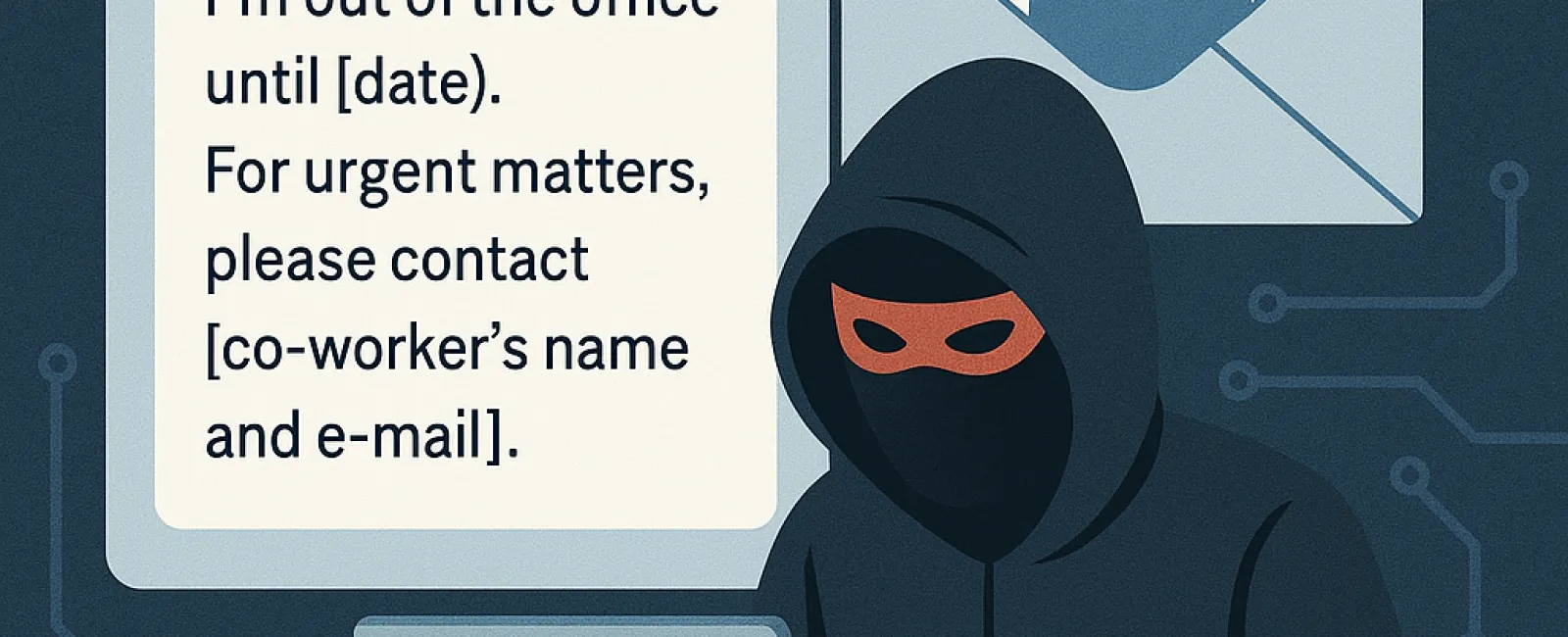June 16, 2025
Set your out-of-office reply and relax—only to realize that while you’re gearing up for vacation, your automatic message is quietly broadcasting to the world:
"Hello! I’m away from the office until [date]. For urgent issues, please reach out to [coworker's name and e-mail]."
Seems harmless and convenient, right?
But this is exactly the type of information cybercriminals crave.
Your simple auto-reply, designed to keep communication flowing smoothly, can inadvertently provide a treasure trove of sensitive details for attackers seeking an easy entry point.
Consider what a typical out-of-office message reveals:
● Your full name and job title
●
The exact dates you’ll be unavailable
● Alternate contacts along with their email addresses
● Details about your team’s structure
●
Sometimes even the reason for your absence (e.g., "Attending a conference in Chicago...")
This information arms cybercriminals with two critical advantages:
1. Timing: They know precisely when you’re away and less likely to detect suspicious activity.
2. Targeting: They can impersonate the right people and tailor scams effectively.
This combination sets the stage for devastating phishing scams or business email compromise (BEC) attacks.
Typical Scam Scenario
Step 1: Your auto-reply is triggered and sent.
Step 2: A hacker leverages this to impersonate you or your listed alternate contact.
Step 3: They dispatch a fraudulent "urgent" email demanding wire transfers, passwords, or confidential documents.
Step 4: Your colleague, unsuspecting, believes the request is genuine.
Step 5: You return from vacation to discover a significant unauthorized transaction—like $45,000 sent to a bogus vendor.
Such incidents are alarmingly common, particularly in businesses with frequent travelers.
If your team includes executives or salespeople who travel often, and someone else manages their communications (such as an assistant or office administrator), your business becomes a prime target for cyberattacks:
● Admins handle emails from multiple sources
●
They regularly process payments, documents, and sensitive requests
●
They often act quickly, trusting the identity of the sender
A single convincing fake email can bypass defenses, resulting in costly breaches or fraud.
Protect Your Business Against Auto-Reply Exploits
Rather than eliminating out-of-office replies, the key is to use them strategically and implement protective measures. Here’s how:
1. Keep Messages General
Avoid sharing specific details or naming backup contacts unless absolutely necessary.
Example: "I’m currently out of the office and will respond upon my return. For immediate help, please contact our main office at [main contact info]."
2. Educate Your Team
Ensure employees understand:
● Never act on urgent financial or sensitive requests based solely on email communication
● Always verify unusual requests through a secondary channel, such as a phone call
3. Deploy Advanced Email Security
Use sophisticated email filters, anti-spoofing technologies, and domain protections to reduce impersonation risks.
4. Enable Multi-Factor Authentication (MFA)
Activate MFA on all email accounts to prevent unauthorized access even if passwords are compromised.
5. Partner with a Proactive IT Security Team
Collaborate with cybersecurity experts who monitor login attempts, detect phishing, and identify suspicious activities before they cause harm.
Enjoy Your Vacation Without Cybersecurity Worries
We specialize in building resilient cybersecurity frameworks that protect your business—even when your team is away.
Click Here or call us at (619) 349-5850 to schedule your FREE 15-Minute Discovery Call.
We’ll assess your vulnerabilities and help you secure your systems so you can truly relax on vacation without worrying about your inbox betraying you.





